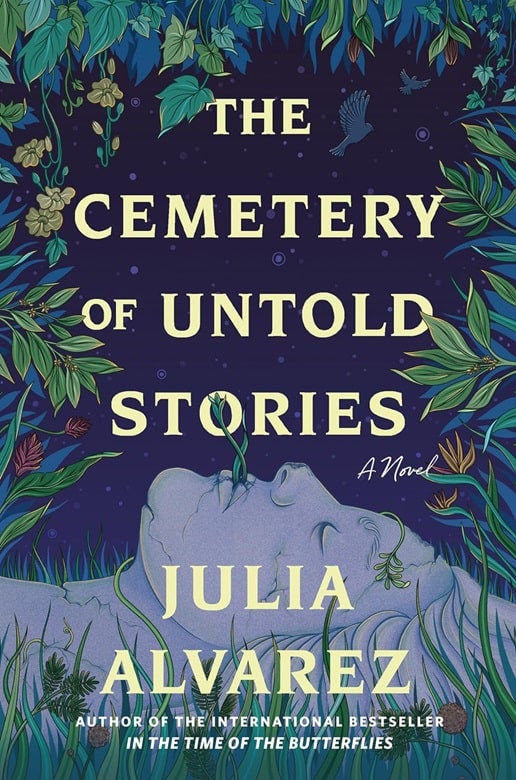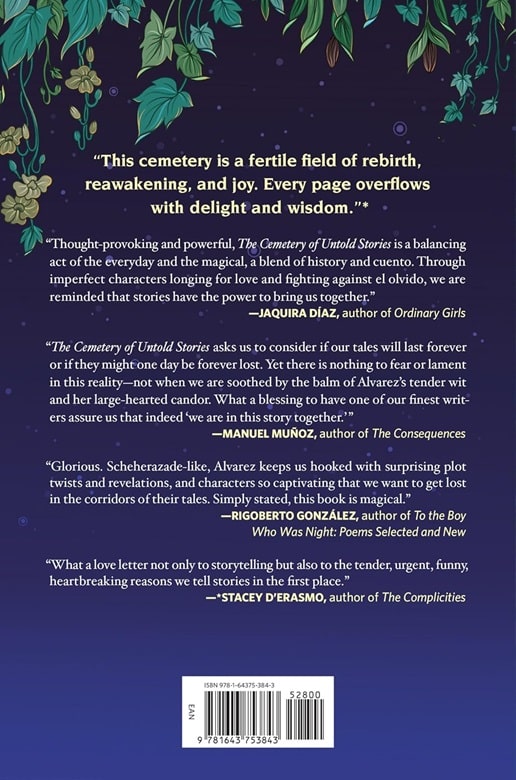Not Fade Away: The Cemetery of Untold Stories by Julia Alvarez
 |
 |
The Cemetery of Untold Stories (Algonquin Books, April 2, 2024). Cover artist unknown
We live our life telling a story
Of what we’ve said and done
But lately you caused me to worry
That you’re spinning fiction
— Amanda Fish, “The Hard Way,” Kingdom
What perhaps separates humans from our fellow creatures is the capacity, indeed the compulsion, of storytelling. Hardly an original observation on my part (cf., The Stortelling Animal by Jonathan Gottschall), though for all we know the white whale biting off the mad captain’s leg is vocalized in Cetacea pods.
Stories, and discussions of stories, are why you are all reading here. Of course it’s not limited to the literate classes, as the rich oral tradition of ancient cultures demonstrates, not to mention the popularity among screen-addicts of so-called “reality shows” of otherwise untalented people whose only achievement is being on a reality show. Though even that low level of celebrityhood is further diluted in an era where just about everyone has their own Instagram following.
We’ve all endured that aged relative who insists on telling the same stories about their youth that we’ve heard so many times before. And will hear many more times again. And that may or may not actually be true. It’s sad they’ve reached a point in their lives where nothing else is going on in but what has already happened, whether or not it actually happened. Sadder still is when we find ourselves repeating our own stale stories to those barely paying attention.
Unlike our older relatives (or ourselves) Alma Cruz, the protagonist of Julia Alvarez’s The Cemetery of Untold Stories (hint, hint), is a late blooming author of characters based on actual people, many of them family members. Writing under the too obvious pseudonym of Scheherazade. Alma feels out of stories to tell. But she’s got boxes of notes for stories she’s never finished. Rather than just retiring and donating her papers to some university archive, she decides on a proper burial (but you already guessed that, because of the title, right?) complete with headstones provided by a sculptor friend.
The internment site is in the Dominican Republic, Alma’s homeland. She goes there to retire along with her unfinished works to rest in peace. But old stories never rest, they retell themselves to anyone who wants to listen. That particular listener is Filomena, a local woman hired as the cemetery groundskeeper with her own sad story. While she can neither read nor write, Filomena is sympathetically receptive to hearing Alma’s characters complete what their author couldn’t finished. Because sometimes stories have a life of their own, no matter how hard we try to shape them.
The abandoned characters at the focus of Filomena’s attention are Bienvenida (which in Spanish means “welcome”), the real-life divorced second wife/mistress of Dominican dictator Rafael Trujillo, and Manuel Cruz, a doctor who actively opposed Trujillo and eventually escaped to the United States. Not only do the tales of Bienvenida and Manuel intertwine, they also entangle their audience in revealing surprising (though at some point you can guess) connections to reality. Or at least the reality that is Alma’s story.
So, this a story about storytelling. A theme that is about as old as, well, storytelling itself. It is perhaps no coincidence that author Julia Alvarez bears certain resemblances to her title character as she reminds us that while all stories (and alas those who read or hear them) end, a larger narrative continues to resurrect what still needs to be told.
David Soyka is one of the founding bloggers at Black Gate. He’s written over 200 articles for us since 2008. His most recent was a review of the novels James, Kindred, and The Reformatory.
[…] My review of Julia Alvarez’s The Cemetery of Untold Stories is now up for your perusal at Blackgate Magazine. […]